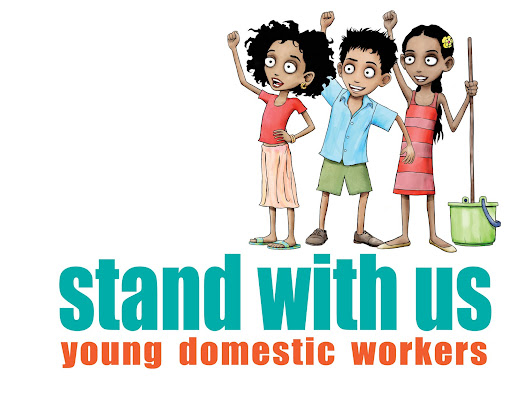Decent Work for Domestic Workers
Recommendations from young domestic workers on a proposed new ILO convention on domestic work
[For the full report click here]
[For the full report click here]
“The great majority of respondents agree with the need to give special attention to the needs of young domestic workers” (ILO ‘Yellow report’ 2010).[1]
For three months, more than 150 current and former child domestic workers from Africa, Asia, Central and Latin America were consulted about the ILO’s proposed standards on domestic work. During the discussions the young people expressed their excitement and hope that the new standards could make a real difference to their lives.
Anti-Slavery International and Children Unite are asking ILO constituents to consider the recommendations in this document in their discussions on the proposed standards.
Young domestic workers have expressed 4 key concerns:
1. Don’t employ underage workers! No-one should be a domestic worker below the national legal minimum working age. Young domestic workers above this age (usually 14 or 15 years) can work, but their employment should be subject to special protection.
2. Protect us at work! Written employment agreements are the best way of ending exploitation and getting young domestic workers back into education.
3. Don’t stay silent! Young domestic workers need urgent protection from physical, sexual and emotional abuse. Local leaders and law enforcers should look out for and assist young domestic workers in abusive situations.
4. Make us more visible! Often isolated, young domestic workers should be locally registered and given opportunities to organise.
Between December 2009 and February 2010, 171 current and former child domestic workers in Costa Rica, India, Peru, Philippines, Tanzania and Togo were asked for their views on the proposed ILO standards, and how they could best be protected from exploitation and abuse.
153 girls and 14 boys took part in consultations in the form of workshops and focus group discussions, facilitated by local organisations with considerable experience in providing direct services to domestic workers: Asociación Grupo de Trabajo Redes (AGTR, Peru); Defensa de los Niños y Niñas International (DNI, Costa Rica); Kivulini Women’s Rights Organisation (Tanzania); National Domestic Workers Movement (India); Visayan Forum Foundation (Philippines); WAO Afrique (Togo).
1. Working age
The views of young domestic workers are clear: employers should stop using underage domestic workers, and should do more to protect those young people who are entitled to work.
Young domestic workers should not be doing work which is beyond their strength and ability, such as taking care of young children, carrying large containers of water, cooking or moving heavy furniture.
2. Written employment agreements
Across the world, young domestic workers are unanimous in their call for written agreements to be introduced and extended to them to regulate their employment and formalise their protection.
These agreements should set:
- Pay;
- Working hours;
- Tasks to be undertaken;
- Rest days and annual leave;
- Medical provisions in times of sickness;
- Time for school, study and vocational training.
Written agreements should apply in extended family settings too, since many employers of young domestic workers are also their family members.
Young domestic workers argued that written agreements are essential in making it clear to employers where their responsibilities lie. Such agreements would assist young domestic workers in understanding and articulating their rights. They would also help in making young domestic workers more visible to the relevant authorities and service providers.
Protection from abuse
Young domestic workers want to see measures that protect them from physical, sexual and emotional abuse in the workplace (their employers’ homes).
In particular they want:
- to maintain contact with their own families, so that their families know where their children are and can monitor their safety;
- local community monitors (such as neighbourhood officials) to be aware of where they work and to check in on them regularly; and help with developing skills to protect themselves from abuse.
In cases of abuse, young domestic workers want:
- accessible and safe ways to report abuse (such as telephone helplines), where they will be believed and their case handled sensitively;
- prompt legal action taken against abusers; and access to temporary shelter, and to immediate medical and psychological care.
- Live-in domestic workers are particularly vulnerable to abuse. If a young domestic worker is living-in she should have her own room and be able to freely leave the house when she chooses.
Visibility and access
Young domestic workers want to be less isolated and more visible in the community and in the homes of their employers. They consider their greater visibility to be crucial to their protection from harm.
In particular, they want:
- to be registered with neighbourhood authorities and their employers visited regularly;
- the media to raise awareness about their situation and information about their rights to be widely circulated;
- to be free to leave their employers’ houses, and to have regular contact with peers and their families.
Most of all, young domestic workers want the opportunity to come together, to organise, to develop associations and to have their voices heard. Wherever possible, young domestic workers and their groups should be able to affiliate to trade unions and to invoke their protection.




